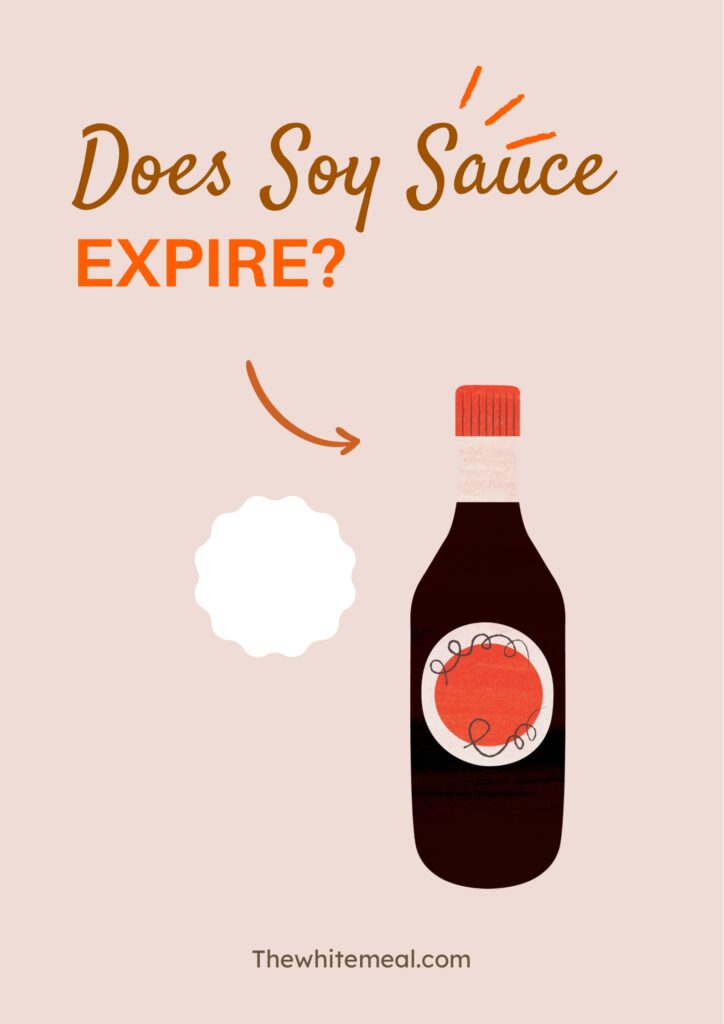If you have a bottle of soy sauce that has been sitting in the pantry or fridge for a very long time, or has sat past its best before date and still looks and smells solid, it’s natural to wonder if the product actually goes bad!
This article uncovers the fact about soy sauce expiration and shows you how to properly preserve a bottle so you can have an element of umami that brings life to an insipid serving of steak, every, darn, time!

What Is The Shelf Life Of Soy Sauce?
Soy sauce doesn’t have a traditional “shelf life” or “expiry date” like many products do, for example, baby foods or drugs.
Instead, it has a best before date that typically falls around 2 years after the production date.
You might be wondering what the difference between shelf life or expiry date and best before date is and why are we making a fuss about it?
Big
That’s what the difference is!
That’s why we’re making a fuss, and here’s why!
The concept of shelf life simply refers to the period of time where a product remains safe to consume and retains its optimal quality, but after which the product is not likely to remain safe for consumption or can negatively impact the health.
Products that have an expiry date are mostly sensitive commodities like baby foods and drugs, and they are recommended to be thrown away once that date has passed, since consuming them could lead to potential health risks.
On the other hand, best before dates indicate when a product’s quality (like flavor, texture or taste) will begin to diminish, not a period after which it becomes safe to use.
Beyond this date, you may notice changes in taste, texture or aroma of the product (or you may not, depending on how far in time you decide to consume it), but when you consume it, it will most likely not affect your system negatively!
Where Is The Best Before Date On Soy Sauce?
Typically, you’ll find the best before date stamped near the neck of the bottle in dotted lines or printed along the side of its label.
The format may vary depending on where it was produced – for example a month/day/year or a day/month/year format might be used for locally produced bottles, while imported Asian varieties could feature year/month/date codes.
Regardless of which format is used, you should always remember that these dates are more of guidelines rather than strict rules for food consumption, and if you play your cards right and store your bottles properly, then they’re safe to consume without any issues.
How Long Is Soy Sauce Good For After Expiration?
For unopened bottles stored properly, soy sauce can remain good for many years after the best before date, and this is all thanks to its acidic nature and high salt content which acts as a natural preservative to prevent the growth of microorganisms.
Before you consume a product that has been storing past its best before date however, make sure to always check for signs of spoilage (see below).
As for opened bottles of soy sauce, they can last up to a year (or even more) if handled and stored correctly.
Keep in mind that the quality will degrade more quickly than a bottle that has its seal intact, which is more reason to consume it quickly.
Does Soy Sauce Need To Be Refrigerated Before And After Opening?
The truth is, soy sauce is a pretty versatile condiment that can be stored in different ways depending on your preferences.
Before Opening: No Need for Refrigeration
Thanks to the fermentation process and high salt content during production, unopened bottles of soy sauce are shelf-stable and don’t require refrigeration. They will keep for a very long time without spoiling.
Simply store them in a cool, dark place like your pantry or cupboard, and they’ll be ready for use whenever you need them.
After Opening: To Chill or Not to Chill?
Once you’ve opened your bottle of soy sauce however, things change a abit, and you now have a couple of options for storage.
If you prefer to maintain its freshness and quality for an extended period of time, storing it in the refrigerator is probably the best choice, as the cooler temperatures will help slow down any degradation in flavor and aroma.
If you’d rather keep your soy sauce within easy reach on the counter or in a cupboard however, that’s perfectly fine too. It won’t go bad, but that’s so long as other things like water don’t get into it.
How To Tell If Soy Sauce Has Gone Bad
Outside the fridge or even inside it, soy sauce, like any other condiment, can go bad if not stored properly (I.e. leaving the bottle open, storing it close to a place that receives a generous amount of sunlight or storing it close to heat sources).
So how do you know if your soy sauce is still good to use?
We’ll, look for the following signs!
Unpleasant Odor
Fresh soy sauce has a distinct aroma that’s both savory and slightly sweet. If your soy sauce smells like nothing you want to get a whiff of anymore, it may have gone bad.
Mold or Cloudiness
If you notice any mold growth inside the bottle or cloudiness in the liquid itself, it’s time to toss your soy sauce. It is dominated by clouds of microorganisms and that’s the last thing you want to consume.
Altered Taste
Say, by chance, you happen to consume a soy sauce before you start to ponder whether or not it may have gone bad, think about the taste.
A good-quality soy sauce should have a balanced mix of salty, sweet and umami flavors. If the taste seems off, too bitter or lacking in depth, it might be past its prime.
Check the Expiration Date
And lastly, to cap it all, if your soy sauce falls into any of the categories or multiple of these categories, and has gone past the best before date, then there is a huge likelihood it has gone bad, and the best thing to do is to discard the product.
How To Store Soy Sauce Properly (Outside)
To ensure your soy sauce stays fresh for as long as possible, follow these storage tips:
- Keep It Cool and Dark: Store your soy sauce in a cool, dark place like a pantry or cupboard away from direct sunlight and heat sources.
- Close It Tight: Make sure the cap is tightly sealed after each use to prevent exposure to air which can introduce contaminants.
- Opt for Glass Bottles: If possible, choose glass bottles over plastic ones as they’re less likely to affect the taste of the soy sauce over time.
More On Soy Sauce Expiration
What Is the Expiration Date of Silver Swan Soy Sauce?
Silver Swan soy sauce is best enjoyed within 1 year of its production date, even though the product will still keep for a few more months before it becomes undesirable to use.
What Is the Expiration Date of Kikkoman Teriyaki Sauce and Soy Sauce?
Kikkoman recommends using their teriyaki sauce within 1 year and 6 months from the production date for optimal taste. As for their soy sauce, it’s best consumed within 2 years after production to ensure maximum flavor and freshness.
What Is the Expiration Date of Datu Puti Soy Sauce?
For Datu Puti soy sauce, it’s advised to use it within 8 months from the production date for the best quality in terms of taste and flavor. This way, you can fully appreciate its distinct taste that brings life to your dishes.
What Does Bad Soy Sauce Smell Like?
Soy sauce has a naturally robust aroma due to fermentation; however, if it starts to bear a sharp chemical smell or rancid odor, it’s a clear sign that it’s no longer suitable for consumption.

